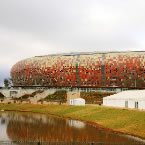Are the new stadiums built for the 2010 World Cup in South Africa, a country where football jostles with rugby and cricket for audience, destined to become white elephants after the month-long tournament?
That's the 12.1-billion-rand, or 1.57-billion-dollar question - the cost of five new stadiums in Cape Town, Durban, Port Elizabeth, Nelspruit and Polokwane.
The "white elephant" spectre is one that has come to haunt World Cup and Olympic Games hosts.
A little over a year after the 2008 Beijing Olympic Games China is struggling to find a real purpose for its 450-million-dollar showpiece Bird's Nest stadium, while one of Germany's 2006 World Cup stadiums in Leipzig also struggles to attract more than a few thousand fans to third-division games.
With six months to go until kick-off in Johannesburg, South Africa is faced with the possibility that some of its new venues will be gathering dust beyond July 2010.
That the country needed a raft of new and improved stadiums is not in doubt.
The country's existing football stadiums were too small and shabby by World Cup standards.
But some of the stadiums are controversial nonetheless.
Cape Town and Durban already had decent rugby stadiums of more than 50,000 seats, which some say could have been expanded to host eight World Cup games each and two semi-finals.
Both cities opted instead for new stadiums.
Wedged between Table Mountain and the Atlantic Ocean, Cape Town's new 68,000-seat Greenpoint stadium has an undeniably stunning backdrop.
But locations like that comes at a price - an extra 1.2 billion rand in site-specific costs to be exact, says Cape Town's 2010 spokesman Pieter Cronje, Cape Town's 2010 manager.
By the time it's finished, Greenpoint stadium will have cost 4.5 billion rand, more than Beijing's Bird's Nest and more than double the initial estimate.
The national government is picking up most of the tab but the city, which like most South African cities is chronically under- funded and struggling to contain violent anti-poverty protests, still faces a hefty shortfall.
And it has yet to secure an anchor tenant: The city's two Premier Soccer League teams have too few fans to fill it and the provincial rugby team is deeply attached to its iconic Newlands Stadium.
Cronje believes Stade de France and local company SAIL, the consortium chosen to operate the venue will fill it with big concerts, operas and other events.
"We believe the long-term advantage will outweigh this extra cost at the outset," he says.
Durban says it was also thinking long-term when it decided to build a new 70,000-seat stadium a few metres from a 52,000-seat rugby stadium.
The port city plans to throw its hat in the ring for the 2024 Olympics and has equipped Moses Mabhida Stadium with an athletics track, as well as a 106-metre arch with inbuilt cable car, to boost its bid.
But that stadium too has been shrouded in skepticism. "It doesn't take a rocket scientist to work out that the city cannot afford it," Brian Van Zyl, manager of the Sharks rugby team that is based at the adjacent Absa Stadium said in 2006.
Back then the stadium was predicted to cost 1.6 billion. Three years later, the cost has nearly doubled to 3.1 billion rand and the Sharks are coming under growing pressure to move in.
"You have to invest in infrastructure to proceed from being a developing country to a developed country," says Errol Heynes, World Cup director in Port Elizabeth, the country's fifth-largest city, which gained a 1.9-billion-rand stadium.
Although Port Elizabeth has no Premier League football or Super 15 rugby team, "it will never, ever be a white elephant," he assured the German Press Agency dpa, predicting a thriving business in exhibition games and conferences.
Polokwane in northern Limpopo province and Nelspruit in north- eastern Mpumalanga have also gained new 45,000-seat stadiums, each costing 1.3 billion rand. Two schools were requisitioned by the builders at Nelspruit's Mbombela stadium, sparking violent protests.
More protests over basic services also appear on the cards in Johannesburg, which slashed its budget by 1 billion rand this year to cover overruns at Soccer City, the 3.4-billion-rand nearly-new venue for the opening game and final.
Danny Jordaan, chief executive of the 2010 local organizing committee chief has defended the spending, saying: "All of the infrastructure programs gave jobs to 415,000 people during this period where most people are shedding jobs, so I think the World Cup has made a contribution."


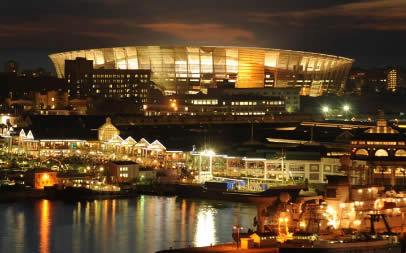




 For
all your Football tickets and events from around the globe be sure to check
out Finaltickets.com. Specialising in tickets that are normally considered
hard to find. We have the lot so dont forget that's www.finaltickets.com.
Click here to visit
For
all your Football tickets and events from around the globe be sure to check
out Finaltickets.com. Specialising in tickets that are normally considered
hard to find. We have the lot so dont forget that's www.finaltickets.com.
Click here to visit 


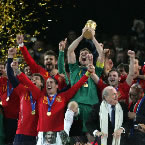

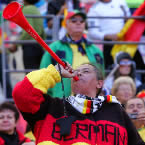
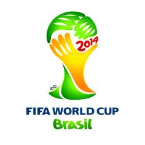
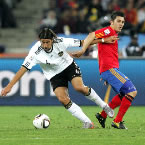
.jpg)



